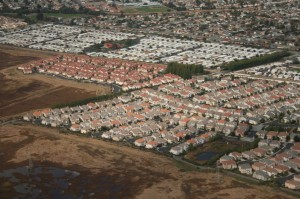Busting Growth
Nov 17th, 2011 | By admin | Category: Economics and GDP, Energy and Carbon Emissions, Water Issues
 By Suzanne York, HowMany.org, November 17, 2011
By Suzanne York, HowMany.org, November 17, 2011
This week was the local premiere of the documentary film Growthbusters: Hooked on Growth. I have been anticipating this movie for awhile now, having been researching and writing on the world’s obsession with endless economic growth on a planet with finite resources. Growthbusters did a good job of laying out the issues concerning unsustainable growth of communities, consumption, and population.
There are so many ways that our society is wrapped up in the relentless pursuit of growth and consumption. But it’s not making us happier, and it’s straining the planet. James Gustave Speth, professor and former dean of the Yale School of Forestry & Environmental Studies and one of the many people interviewed in Growthbusters, recently wrote about the need for creating a new vision of economic growth. According to Speth, “The never-ending drive to grow the overall U.S. economy is ruining the environment; it fuels a ruthless international search for energy and other resources; it fails at generating the needed jobs; it hollows out communities; and it rests on a manufactured consumerism that is not meeting the deepest human needs. Americans are substituting growth and consumption for dealing with the real issues…” (such as meaningful work, family, community, learning).
One small part of the film that has stuck with me is how the city of Colorado Springs, which has almost doubled in population since 1985 to over 400,000 people, only receives 15 inches of rain per year. Yet it is planning to spend $880 million on pumping water uphill via a 62-mile pipeline from Pueblo Dam to Colorado Springs, using a lot of energy to do so and raising rates for residents. Hasn’t anyone learned from the examples of Los Angeles and Las Vegas, just to name two, that you shouldn’t build huge cities in the desert?
The film touched upon some concepts and initiatives that we can aspire to, as we begin to accept the reality of living within our means and the carrying capacity of the earth. One is the steady-state economy, which is predicated on a stable population with mildly fluctuating levels in consumption of energy and materials. It would focus on things like shorter work weeks and greater income equality.
A second initiative is already taking place through the Transition Towns movement. The premise is that towns transition from a reliance on fossil fuels and other unsustainable processes and evolve into resilient communities. To do this, citizens support and cultivate local agriculture, production, business, and energy to help their communities thrive and move away from the endless economic growth paradigm. According to the Transition Network, there are transition towns in in Australia, Canada, England, Germany, Ireland, Italy, the Netherlands, New Zealand, Scotland, South Africa, Spain, Sweden, USA, and Wales.
Ultimately we have a responsibility to future generations. Most of us have lived the good life, but it is partly at the expense of those who come after us. We may have oil for decades more, but eventually we will use it up. The resources will not always be there to sustain our “western” lifestyle. It would take 5 planets like Earth to support everyone in the world living an average American lifestyle. At the very least, Growthbusters forces us to think about the choices we make today. We can continue to sprawl our cities, consume useless goods, and work long hours so we can keep corporations, big developers and the wealthy fat and happy. Or we can take matters into our own hands and build the sustainable future most of us want.
Thomas Friedman of the New York Times wrote earlier this year in a column titled “The Earth is Full” that we will not change systems without a crisis, and that we’re getting there. I hope he is wrong and that we humans are smart enough to take matters into our own hands now before we hit the tipping point.
